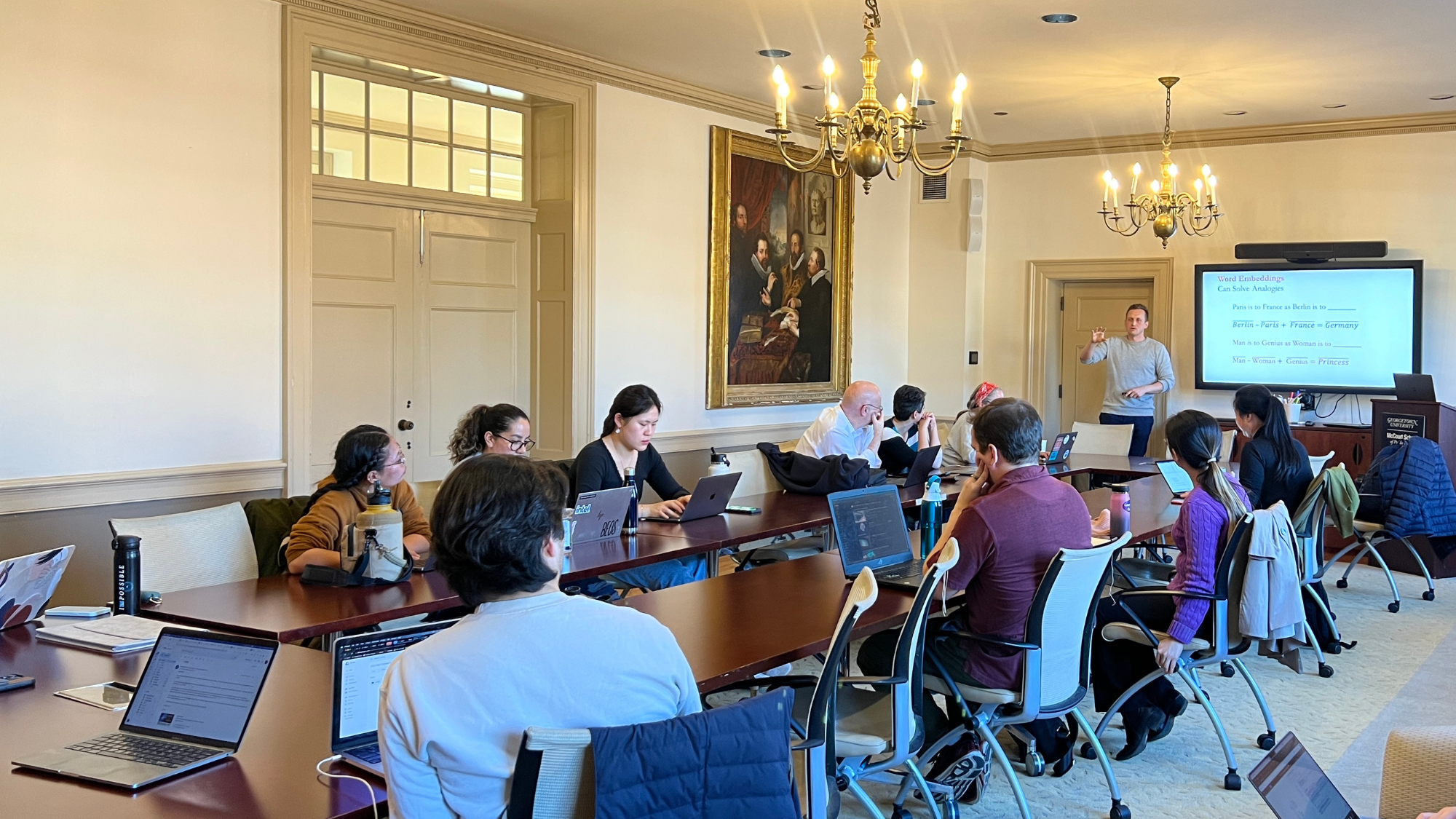Each semester, the Massive Data Institute at the McCourt School of Public Policy at Georgetown University sponsors technical data processing and analysis workshops to provide Georgetown University faculty, students, and staff the opportunity to be exposed to new methods, programming paradigms, and technologies.
This Spring’s theme is non-traditional data analysis. We will move from network to temporal to spatial to image analysis. Learn more and register for four Spring 2024 MDI Workshops below (please note there is a separate registration for each month; you can join one or all of them). To learn more about the MDI Fellows who will be leading this semester’s workshops, please visit: https://mdi.georgetown.edu/mdi-fellows/
For more information on MDI events, check out our events calendar. Any questions, please reach out to mdiresearch@georgetown.edu
January 2024: Network Methods for an Interconnected World with Dr. Helge Marahrens
When: Monday, January 22 & Tuesday, January 23, 2024, 4:00 pm – 5:30 pm (each day)
Location: Main Campus — this event is only in-person
Register: https://bit.ly/MDIWorkshopJan2024
Abstract: Classic statistical techniques often assume independent observations, but many interesting datasets contain interdependencies. For network scholars, such dependencies between observations (nodes) are not simply a nuisance that needs to be “controlled for,” but rather the main focus of analysis. For example, to understand who finds a job, network scientists may analyze personal networks (who somebody knows) rather than their skills and talents (what somebody knows). In this workshop, we cover the basics of network analysis, including how to construct a network, how to measure different network properties, and how to model different types of interdependencies. The first day of the workshop covers techniques to extract node characteristics, describe entire networks, and model networks as outcomes. The second day introduces two-mode networks (e.g., between customers and products) and machine learning methods for link prediction problems, which can be used for recommender systems, fraud detection, and much more. Workshop activities will be conducted in Python (no experience required.)
February 2024: Timely Data Analysis: Modeling and Exploiting Temporal Correlation with Dr. Nathan Wycoff
When: Monday, February 26 & Tuesday, February 27, 2024, 4:00 pm – 5:30 pm (each day)
Location: Main Campus — this event is only in-person
Register: https://bit.ly/MDIWorkshopFeb2024
Abstract: Making management decisions in business or policy decisions in government often involve taking into account the future state of some aspect of the world. Decision makers have long sought to use present day trends to anticipate what will happen next. In this workshop, we will start by covering the basic statistical tools often used by forecasters through a series of case studies. We will start with basic time series models such as ARIMA models before covering some of the latest machine learning tools based on neural networks that have been developed for the purposes of extrapolation into the future. Throughout the workshop, we will discuss digital data sources which can be useful in developing forecasts. We’ll conclude with a discussion of the prospects and limitations of forecasting. Workshop activities will be conducted in Python.
March 2024: Mapping Spatial Dependence: An Introduction to Spatial Data Analysis with Dr. Le Bao
When: Monday, March 18 & Tuesday, March 19, 2024, 4:00 pm – 5:30 pm (each day)
Location: Main Campus — this event is only in-person
Register: https://bit.ly/MDIWorkshopMar2024
Abstract: Spatial dependence is increasingly recognized as crucial in a variety of fields, driving the need for spatial analysis to understand the spatially interconnected nature of social, economic, and political phenomena. In this workshop, we will begin with the issues of spatial data – spatial structures, relationships, and dependencies that exist in different domains. We will then shift focus to methods in different areas of spatial data analysis, including point pattern analysis, regression and inference with spatial data, spatial interpolation, as well other methods for handling complex spatial data structures. Basic familiarity with programming and regression models is expected. The workshop will primarily use R for demonstrations and examples, but we will also offer support for participants interested in using Python.
April 2024: Next Generation Generative Models for Vision Related Tasks with Dr. Rupayan Mallick
Date: Monday, April 15 & Tuesday, April 16, 2024, 4:00 pm – 5:30 pm (each day)
Location: Main Campus — this event is only in-person
Register: https://bit.ly/MDIWorkshopApr2024
Abstract: High quality image generation and synthesis have been of utmost importance in many computer vision tasks such as inpainting, relighting and other image editing and generation tasks. While generative models (adversarial networks and autoencoders) have been the state of the art, diffusion models have gained recent attention. These models are trained by adding gaussian noise to the data and then trying to recover/denoise this noisy data. This workshop will begin by exploring the basics of generative models, including GANs and GITs models. We will then discuss diffusion models. After describing the basics we will do some hand-on activities using these models to generate some examples from certain applications such as inpainting, adding photorealistic effects. A basic understanding of python programming is expected. Familiarity with neural networks would be helpful but is not required. Workshop activities will be conducted in Python.
Any questions, please reach out to mdiresearch@georgetown.edu
About the Massive Data Institute (MDI): At Georgetown’s McCourt School of Public Policy, the Massive Data Institute is an interdisciplinary research institute that connects experts across computer science, data science, public health, public policy, and social science to tackle societal scale issues and impact public policy in a way that improves people’s lives through responsible evidence-based research. For more information on MDI, please visit https://mdi.georgetown.edu/ To learn about additional upcoming MDI workshops and events, please visit: https://mdi.georgetown.edu/mdi-events/

